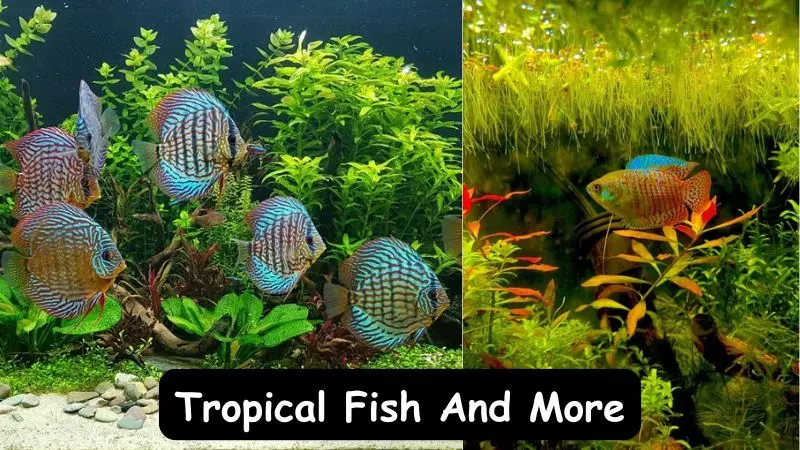fish diversity
Tropical Fish And More
The shimmering scales of a neon tetra, the graceful dance of a Siamese fighting fish, the vibrant hues of a butterflyfish – these are just a glimpse into the captivating world of tropical fish.
But the allure of tropical fish extends far beyond their aesthetic appeal. They represent a fascinating intersection of biology, ecology, and conservation, offering a unique opportunity to learn about the delicate balance of life within aquatic environments.
This essay of fishtankmagic.com will delve into the captivating world of tropical fish, exploring their diverse species, the intricate ecosystems they inhabit, and the challenges they face in the face of human impact.
The Diversity of Tropical Fish
The term “tropical fish” encompasses a vast array of species, each with its own unique characteristics and adaptations. From the tiny, shimmering neon tetras to the imposing, predatory piranhas, the diversity of tropical fish is staggering. These species have evolved over millions of years to thrive in a wide range of aquatic environments, from the shallow, sun-drenched waters of coral reefs to the murky depths of rainforest rivers.
Coral Reefs: These vibrant underwater ecosystems are home to a dazzling array of tropical fish, including the iconic butterflyfish, angelfish, and clownfish. The intricate coral structures provide shelter and food for these fish, while the clear, warm waters offer ideal conditions for their survival. The vibrant colors and patterns of these fish serve both as camouflage and as a means of attracting mates.
Freshwater Streams and Rivers: Tropical freshwater habitats are also teeming with life, hosting a diverse array of fish species, including the popular guppies, swordtails, and tetras. These fish have adapted to the fluctuating water conditions and often rely on vegetation for shelter and food. Some species, such as the Siamese fighting fish, have evolved elaborate courtship rituals and aggressive territorial behavior.
The Importance of Habitat Preservation
The vibrant diversity of tropical fish is inextricably linked to the health of their habitats. Coral reefs, freshwater streams, and other aquatic environments face a multitude of threats, including pollution, overfishing, and climate change. These threats can disrupt the delicate balance of these ecosystems, leading to the decline and even extinction of tropical fish species.
Pollution: Runoff from agricultural and industrial activities can introduce harmful pollutants into aquatic environments, damaging coral reefs, poisoning fish, and disrupting the food chain.
Overfishing: Unsustainable fishing practices can deplete fish populations, disrupting the delicate balance of the ecosystem and threatening the livelihoods of local communities.
Climate Change: Rising ocean temperatures and acidification are causing widespread damage to coral reefs, bleaching the coral and making it difficult for fish to survive.
Tropical Fish and More: A Web of Life
The captivating world of tropical fish extends far beyond the individual species. These fish are part of a complex and interconnected web of life, interacting with a diverse array of plants, invertebrates, and other fish species.
Plants: Plants play a vital role in aquatic ecosystems, providing oxygen, shelter, and food for fish. Some plants, such as water hyacinths, can even help to filter pollutants from the water.
Invertebrates: Invertebrates, such as shrimp, crabs, and snails, are an important part of the food chain, providing food for fish and other predators. They also play a vital role in nutrient cycling and decomposition.
Other Fish Species: Tropical fish interact with a wide variety of other fish species, forming complex predator-prey relationships and competing for resources. These interactions help to maintain the balance of the ecosystem.
The Role of Aquarists in Conservation
Aquarists play a vital role in the conservation of tropical fish. By choosing sustainably sourced fish and supporting responsible breeding practices, aquarists can help to reduce the pressure on wild populations. They can also contribute to conservation efforts by educating others about the importance of habitat preservation and the threats facing tropical fish.
The Captivating World of “More”
The term “more” encompasses the vast array of life that surrounds tropical fish, including the intricate ecosystems they inhabit, the diverse array of plants and invertebrates they interact with, and the complex web of relationships that connect them.
Ecosystems: Tropical fish habitats are complex and dynamic, with a wide range of physical and chemical factors influencing the distribution and abundance of life. Understanding these ecosystems is crucial for effective conservation efforts.
Plants and Invertebrates: The plants and invertebrates that inhabit tropical fish habitats play a vital role in the health and stability of these ecosystems. By providing food, shelter, and oxygen, these organisms support the entire food web.
Relationships: Tropical fish interact with other species in a variety of ways, including predator-prey relationships, competition, and symbiosis. These interactions shape the evolution and behavior of these species, contributing to the diversity and resilience of the ecosystem.
The Future of Tropical Fish
The future of tropical fish is uncertain, as they face increasing threats from human activities. However, by promoting responsible aquarism, supporting habitat conservation efforts, and raising awareness about the importance of these species, we can help to ensure that these captivating creatures continue to thrive in the wild.
Conclusion
The world of tropical fish is a captivating one, offering a glimpse into the vibrant ecosystems of the tropics and the intricate web of life that connects them. From the shimmering scales of a neon tetra to the graceful dance of a Siamese fighting fish, these miniature marvels are a testament to the beauty and diversity of the natural world. By understanding the challenges facing tropical fish and supporting conservation efforts, we can help to ensure that these captivating creatures continue to grace our aquariums and the waters of our planet for generations to come.












